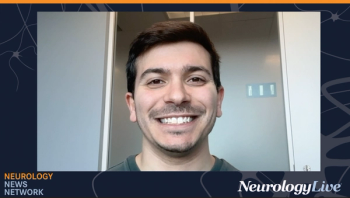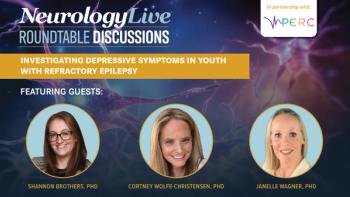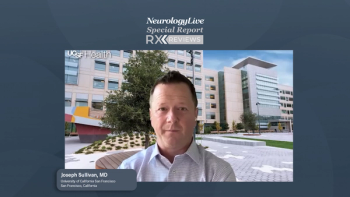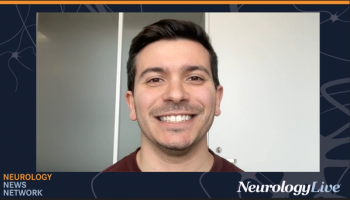
Neurology News Network for the week ending January 17, 2025. [WATCH TIME: 4 minutes]

Neurology News Network for the week ending January 17, 2025. [WATCH TIME: 4 minutes]

Pediatric specialists reflected on the goal and findings of the study, describing the elevated prevalence of depressive symptoms among youth with epilepsy and highlighting temporal lobe epilepsy as a particularly high-risk subgroup. [WATCH TIME: 2 MINUTES]

A panelist discusses how partial vs full activation of D1/D5 receptors can differentially influence downstream signaling pathways, potentially leading to more favorable clinical outcomes with fewer adverse effects in Parkinson disease treatment.

A panelist discusses how tavapadon’s D1/D5 receptor selectivity may offer potential benefits such as improved motor symptom control with a reduced risk of adverse effects commonly associated with traditional dopamine agonists.

In this segment, the physicians emphasize the importance of multidisciplinary care in managing the complex, lifelong needs of patients with NF1. One physician describes how comprehensive NF programs rely on coordinated input from neurology, ophthalmology, orthopedics, pulmonology, urology, endocrinology, dermatology, nephrology, neurosurgery, and psychosocial specialists to address the diverse medical and cognitive challenges associated with the condition. They highlight the essential role of neuropsychology, noting that many patients require ongoing assessment, educational support, and accommodations—services that are often harder to access in adulthood. The discussion then shifts to emerging treatments for plexiform neurofibromas. While MEK inhibitors remain the current standard, ongoing research is exploring combination therapies and novel agents with lower toxicity to reduce long-term treatment burdens. Finally, the physicians stress the need for proactive conversations about fertility, pregnancy safety, and “drug vacations” for young adults hoping to start families. They underscore the importance of genetic counseling and careful planning to balance treatment efficacy with reproductive goals.

At CTAD 2025, the director of Banner Alzheimer’s Institute discussed emerging epidemiologic and translational evidence suggesting that certain vaccines may confer protection against dementia. [WATCH TIME: 6 minutes]

The associate professor at The University of Tokyo talked about how lifestyle-focused multidomain interventions, including exercise, sleep, and nutrition, may improve cognitive function. [WATCH TIME: 4 minutes]

Genetic testing plays a crucial role in diagnosing Dravet syndrome early, guiding treatment plans, and improving patient outcomes.

Genetic testing plays a crucial role in diagnosing Dravet syndrome early, guiding treatment plans, and improving patient outcomes.

At MDS 2025, the professor of neurology at University de Tunis El Manar described the role of global collaboration in advancing the understanding, diagnosis, and management of Parkinson disease. [WATCH TIME: 6 minutes]

The research portfolio director at the Muscular Dystrophy Association spoke about ongoing advances in ALS research and how they may inform approaches to therapeutic development. [WATCH TIME: 5 minutes]

Joseph Sullivan, MD, discussed the importance of initiating transition-of-care conversations early and emphasizing psychosocial context when transferring adolescents with epilepsy to adult providers.

The clinical assistant professor at Feinberg School of Medicine outlined some of the major revisions proposed for the NMOSD diagnostic criteria presented at ECTRIMS 2025. [WATCH TIME: 8 minutes]

Neurology News Network for the week ending January 10, 2025. [WATCH TIME: 4 minutes]

In this segment, the physicians discuss how MEK inhibitor dosing differs between pediatric and adult patients with NF1-associated plexiform neurofibromas. One physician explains that children are typically dosed using weight-based or body surface area–based calculations, whereas adults receive standard fixed dosing. However, both physicians emphasize that individualized dosing is often necessary regardless of age. They describe how starting at a lower-than-recommended dose can reduce early side effects—an approach particularly valuable for adults who may discontinue treatment if initial tolerability is poor. The physicians note that some patients achieve meaningful clinical benefits, including pain reduction, even at these reduced doses, eliminating the need to escalate therapy. They highlight that dose adjustments should reflect patient goals, symptom severity, and overall tolerability, especially because many adults are treated primarily for pain relief rather than rapid tumor progression. Both clinicians acknowledge that while these modified approaches deviate from strict guidelines, they are widely practiced and often improve adherence and quality of life.

In this segment, the physicians explore the broad health maintenance needs and everyday challenges faced by adults with NF1 as they move further into their twenties and thirties. One physician notes that, beyond cancer surveillance, adults must manage cutaneous neurofibromas, increasing vascular risks, recurrent headaches, and hypertension—conditions that may signal vasculopathy or serious complications such as pheochromocytoma. The discussion highlights the importance of regular blood pressure monitoring and educating patients that even mild hypertension should not be ignored in the NF1 population. They also address treatment adherence, emphasizing that adults may discontinue MEK inhibitor therapy at the first sign of side effects, unlike pediatric patients whose parents manage their care. Clear expectations, proactive side-effect management, and structured “treatment contracts” help sustain adherence. Cognitive challenges—including ADHD, executive dysfunction, and intellectual disability—further complicate adult independence, employment, and insurance continuity. The physicians underscore the need for ongoing healthcare engagement, even when symptoms seem minimal, because NF1 remains a lifelong condition requiring continuous surveillance.

A panelist discusses how current FDA-approved dopamine agonists (DAs), which primarily target D2 and D3 receptors, present a complex clinical challenge due to the need to balance their efficacy with a notable risk of adverse events.

A panelist discusses how adjunctive therapies in Parkinson disease optimize and sustain dopamine levels in the central nervous system through various mechanisms of action that complement levodopa therapy.

At ECTRIMS 2025, the professor of biomedical engineering at the University of Bern discussed virtual reality technologies for multiple sclerosis rehabilitation. [WATCH TIME: 3 minutes]

Healthcare providers discuss the emotional challenges of addressing SUDEP with families of epilepsy patients, emphasizing the need for open communication and support.

Explore the patient journey of Dravet syndrome, including symptoms, diagnosis, and treatment options from expert perspectives and personal experiences.

The director of the EEG/Epilepsy Unit in the Department of Clinical Neurosciences at Lausanne University Hospital in Switzerland discussed post-anoxic seizure management at 2025 AES Annual Meeting. [WATCH TIME: 3 minutes]

The staff neurologist at the Mellen Center for Multiple Sclerosis at Cleveland Clinic shared data from the phase 2 CALIPER trial of vidofludimus calcium in progressive MS presented at ECTRIMS 2025. [WATCH TIME: 7 minutes]

The chief research officer of the Muscular Dystrophy Association outlined MDA’s growing focus on muscle regeneration research and explains why the 2026 MDA Conference is a must-attend meeting for clinicians. [WATCH TIME: 3 minutes]

A neurologist at St Vincent's Hospital shared recently presented findings from a phase 2 study of tazbentetol, a novel synaptogenic small molecule, in mild-to-moderate Alzheimer disease. [WATCH TIME: 4 minutes]

The Baldwin Keyes Professor of Neurology at the Sidney Kimmel Medical College at Thomas Jefferson University and Founder’s Award recipient discussed the state of the epilepsy care community and his outlook for the future. [WATCH TIME: 4 minutes]

The assistant professor at the University of Southern California discussed how intentional, community-centered recruitment strategies can improve diversity, trust, and retention in neurodegenerative studies. [WATCH TIME: 6 minutes]

The chief research officer of the Muscular Dystrophy Association outlined emerging scientific priorities and community-driven initiatives shaping the 2026 MDA Clinical and Scientific Conference. [WATCH TIME: 4 minutes]

Neurology News Network for the week ending January 3, 2025. [WATCH TIME: 4 minutes]

In this segment, the physicians explore the challenges and priorities involved in transitioning patients with NF1 from pediatric to adult care. One physician describes how his center follows patients from infancy through adulthood, while noting that many institutions must formally transition patients to adult providers. They emphasize that adult NF1 management requires a shift in focus: during childhood and adolescence, the primary goal is supporting school success and monitoring for complications such as optic pathway gliomas, plexiform neurofibromas, and spinal cord compression. After age 18, however, additional adult-onset risks emerge, including cutaneous neurofibromas, malignant peripheral nerve sheath tumors, and significantly increased breast cancer risk in women beginning around age 30. The conversation highlights the importance of comprehensive screening—often with full head-to-toe MRI—to establish a clinical baseline during transition. Yet many adults arrive without prior imaging or education about NF1-related risks, requiring providers to deliver extensive counseling on surveillance and long-term disease management.